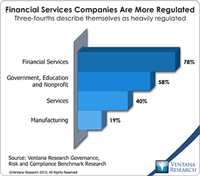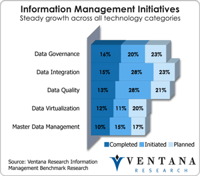Integrated risk management (IRM) was a major theme at IBM’s recent Smarter Risk Management analyst summit in London. In the market context, IBM sees this topic as a means to differentiate its product and messaging from those of its competitors. IRM includes cloud-based offerings in operational risk analytics, IT risk analytics and financial crimes management designed for financial institutions and draws on component elements of software that IBM acquired over the past five years, notably from ...
Read More
Topics:
GRC,
Office of Finance,
Operational Performance Management (OPM),
Chief Risk Officer,
CRO,
ERM,
OpenPages,
Business Analytics,
Business Collaboration,
Cloud Computing,
Data Governance,
Governance, Risk & Compliance (GRC),
IBM,
Business Performance Management (BPM),
compliance,
Customer Performance Management (CPM),
Data,
Information Applications (IA),
Information Management (IM),
IT Performance Management (ITPM),
Risk,
Supply Chain Performance Management (SCPM),
Financial Services,
FPM
At this year’s Inforum user group conference, Infor representatives showed the progress the organization has made since last year in transforming itself from a ragbag of mostly small, often obsolete software companies to a competitive vendor of a modern enterprise management software suite. Infor was created by private equity investors employing a “rollup” strategy, aimed at combining smaller companies within an industry to form a single larger company that could achieve economies of scale and...
Read More
Topics:
Big Data,
Mobile,
Planning,
Social Media,
GRC,
Office of Finance,
Operational Performance Management (OPM),
Budgeting,
closing,
Analytics,
Business Analytics,
Business Collaboration,
Cloud Computing,
Collaboration,
Business Performance Management (BPM),
CFO,
Customer Performance Management (CPM),
Financial Performance Management (FPM),
Infor,
Information Management (IM),
IT Performance Management (ITPM),
Risk,
Sales Performance Management (SPM),
Supply Chain Performance Management (SCPM),
Workforce Performance Management (WPM),
FPM,
SEC
The idea of devising and using maturity assessments to improve business performance has been a staple of management, functional and strategic consultants for decades. It’s based on two unassailable principles. One is the general assertion that companies differ in their ability to do anything along a range from nonexistent to advanced. The second is that at any time it’s possible for a knowledgeable individual to construct a scale of competence for some business function from least to most...
Read More
Topics:
Performance Management,
Social Media,
Customer Experience,
Governance,
Operational Performance Management (OPM),
Business Analytics,
Business Collaboration,
Business Intelligence,
Cloud Computing,
Governance, Risk & Compliance (GRC),
Operational Intelligence,
Business Performance Management (BPM),
Customer Performance Management (CPM),
Financial Performance Management (FPM),
Information Applications (IA),
Information Management (IM),
IT Performance Management (ITPM),
Sales Performance Management (SPM),
Supply Chain Performance Management (SCPM),
Workforce Performance Management (WPM),
benchmark,
FPM
Two key themes that emerged from Larry Ellison’s Sunday night keynote at this year’s Oracle OpenWorld were faster processing speed and cheaper storage. An underlying purpose to these themes was to assert the importance of Oracle’s strategic vertical integration of hardware and software with the acquisitions of Sun. I try to view technology keynotes like this from the perspective of a practical business user. Advancements such of these are important because enhancing the performance and...
Read More
Topics:
Big Data,
Customer Experience,
executive,
Business Analytics,
Data Management,
In-Memory Computing,
Information Management,
Business Performance Management (BPM),
Business Process Management,
Data,
Financial Performance Management (FPM),
IT Performance Management (ITPM),
FPM
One of the community groups to which I donate my time is an organization that puts on a Concours d’Élegance – a vintage car show. Such Concours date back to seventeenth-century France, when wealthy aristocrats gathered to see who had the best carriages and most beaudacious horses. Our Concours serves as the centerpiece to a broader mission of raising money for several charities. There a many such events in the United States and elsewhere, but this one, which has been held every year since 1956,...
Read More
Topics:
Big Data,
GRC,
Operational Performance Management (OPM),
Business Analytics,
Business Intelligence,
CIO,
Operational Intelligence,
Business Performance Management (BPM),
CFO,
finance,
Financial Performance Management (FPM),
Information Management (IM),
IT Performance Management (ITPM),
Talent Management,
FPM
Our research consistently finds that defects in data are the root cause of a wide range of problems encountered by modern corporations. The magnitude of the problem correlates with the size of the company: Big companies have bigger headaches than midsize ones. Data issues diminish productivity in every part of a business as people struggle to correct errors or find workarounds. Issues with data are a man-made phenomenon, yet companies seem to treat bad data as some sort of force of nature like...
Read More
Topics:
Big Data,
Predictive Analytics,
GRC,
Operational Performance Management (OPM),
Business Analytics,
Business Intelligence,
CIO,
Operational Intelligence,
Business Performance Management (BPM),
CFO,
Customer Performance Management (CPM),
finance,
Financial Performance Management (FPM),
Information Management (IM),
IT Performance Management (ITPM),
Sales Performance Management (SPM),
Supply Chain Performance Management (SCPM),
Workforce Performance Management (WPM),
FPM
One of the most important trends in business over the past 20 years has been the broadening use of information technology to manage and support activities. In the early decades of business computing, companies developed islands of automation for largely numeric functions such as billing, inventory management and accounting. Each ran on a proprietary system and engaged the time of a relative handful of employees. Today, just about everyone works with an IT system for at least some of their...
Read More
Topics:
Big Data,
Performance Management,
Predictive Analytics,
Customer Experience,
Governance,
GRC,
Operational Performance Management (OPM),
Management,
Analytics,
Business Intelligence,
Governance, Risk & Compliance (GRC),
Business Performance Management (BPM),
compliance,
finance,
Financial Performance Management (FPM),
IT Performance Management (ITPM),
Risk,
financial risk management,
IT Risk Management
Risk has always been an integral part of business, but our recent Governance, Risk and Compliance (GRC) benchmark research shows that companies deal with risk with varying degrees of effectiveness – especially operational risk. A majority of companies lag in their overall GRC maturity, as I covered in a recent blog post. Operational risk management should be of greater interest to executives today because they can have greater control of it than before. The expansion of IT systems to automate...
Read More
Topics:
Big Data,
Performance Management,
Predictive Analytics,
Customer Experience,
Governance,
GRC,
Operational Performance Management (OPM),
Management,
Analytics,
Business Analytics,
Business Collaboration,
Business Intelligence,
Governance, Risk & Compliance (GRC),
Operational Intelligence,
Business Performance Management (BPM),
compliance,
Customer Performance Management (CPM),
finance,
Financial Performance Management (FPM),
Information Applications (IA),
Information Management (IM),
IT Performance Management (ITPM),
Risk,
Sales Performance Management (SPM),
Supply Chain Performance Management (SCPM),
Workforce Performance Management (WPM),
financial risk management
Ventana Research recently completed benchmark research on governance, risk and compliance (GRC), three business activities that are naturally linked. Although managing them requires separate and sometimes very different processes, on the whole these activities affect each other: Effective corporate governance ensures compliances with laws, regulations and company policies, and without governance, there’s no way to control risk. Separately or considered together, managing governance, risk and...
Read More
Topics:
Big Data,
Customer Experience,
Governance,
GRC,
Operational Performance Management (OPM),
Management,
Business Analytics,
Business Collaboration,
Governance, Risk & Compliance (GRC),
Business Performance Management (BPM),
compliance,
Financial Performance Management (FPM),
Information Management (IM),
IT Performance Management (ITPM),
Risk,
Workforce Performance Management (WPM),
financial risk management
Infor described this year’s Inforum user group meeting as a coming-out party for a large startup company. Such a debut was necessary because Infor had been operating in something of a stealth mode for the past three years: a limited marketing presence, no unified message and a weak, sometimes inconsistent brand identity. It also needed to formally introduce Infor to customers of Lawson, the ERP supplier it acquired last year. The “startup” designation is meant to signal that Infor has been able...
Read More
Topics:
Performance Management,
Salesforce.com,
SAP,
Social Media,
Sustainability,
ERP,
Human Capital Management,
Marketing,
Operational Performance Management (OPM),
Epiphany,
expense management,
Lawson,
Business Analytics,
Business Collaboration,
Business Intelligence,
Business Mobility,
Cloud Computing,
Governance, Risk & Compliance (GRC),
IBM,
Operational Intelligence,
Oracle,
CRM,
Customer Performance Management (CPM),
finance,
Financial Performance Management (FPM),
Infor,
Information Applications (IA),
Information Management (IM),
IT Performance Management (ITPM),
Sales Performance Management (SPM),
Supply Chain,
Supply Chain Performance Management (SCPM),
Workforce Performance Management (WPM),
Financial Performance Management













